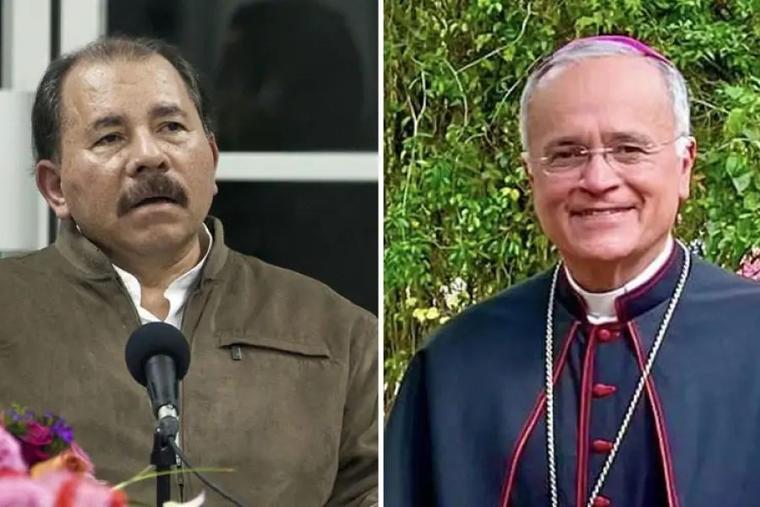Dictatorship in Nicaragua Closes out 2023 With 2 Bishops and 15 Priests in Custody
Nicaraguan lawyer and researcher Martha Patricia Molina, author of the investigative report titled “Nicaragua: A Persecuted Church?”, has been tracking the attacks of the Ortega and Murillo regime on the Catholic Church since 2018.

The dictatorship of President Daniel Ortega and his wife, Vice President Rosario Murillo, in Nicaragua ended 2023 with two bishops, 15 priests, and 2 seminarians in custody. The most recent arrests took place Dec. 31.
Nicaraguan lawyer and researcher Martha Patricia Molina, author of the investigative report titled “Nicaragua: A Persecuted Church?”, has been tracking the attacks of the Ortega and Murillo regime on the Catholic Church since 2018.
In a Dec. 31 update, Molina reported that Father Gustavo Sandino Ochoa, pastor of Our Lady of Sorrows Parish in Santa María located in the Pantasma region in the Diocese of Jinotega, “was abducted by police and paramilitaries” that same day. Molina, a lawyer who lives in exile in the United States, noted that the priest “suffers from multiple illnesses.”
Father Sandino’s arrest was the most recent in the wave of abductions carried out by the Nicaraguan dictatorship in December, including the arrest of Bishop Isidoro del Carmen Mora of the Diocese of Siuna.
Bishop Mora “was abducted by police and paramilitaries” on Dec. 20, Molina reported. The prelate “was going to celebrate some confirmations at [Holy] Cross Parish in [La Cruz del] Río Grande. The day before his abduction he had prayed for Bishop Rolando Álvarez. To date there is no formal accusation against him and there is no information about his whereabouts.”
Only two of the abducted priests — Monsignor Óscar Escoto and Father Jader Guido, taken away on Dec. 22 and 24, respectively — were later released, Molina added. However, she noted that both continue to be “under police and paramilitary surveillance.”
Bishop Álvarez: In Regime Custody for a Year and a Half
The most emblematic case of the abductions carried out by the Nicaraguan dictatorship is that of the bishop of Matagalpa, Rolando Álvarez. Beginning Aug. 4, 2022, police surrounded his residence, not permitting him to leave. The regime then transferred him in the middle of the night of Aug. 19 to Managua, where he was placed under house arrest.
Finally, after a highly questionable trial, Bishop Álvarez was sentenced in February 2023 to more than 26 years in prison, accused of being “a traitor to the homeland.”
Bishop Báez: ‘Do Not Leave Us All Alone’
In a video message posted on YouTube on Dec. 30, Bishop Silvio José Báez, the auxiliary bishop of Managua who has been living in exile in the U.S. since 2019 due to threats from the dictatorship, denounced the regime’s “relentless and abiding hatred of the Church”: “The tyrants are aware that the Nicaraguan people love their Church and their pastors and are terrified by the existence of a people that are aware and rally around the Christian faith, because they are a critical, free people and the protagonists of their own history.”
Bishop Báez also appealed to the Catholic Church throughout the world: “We beg you, we ask you to turn your eyes toward Nicaragua. Do not leave us all alone; offer your prayers for our oppressed people and raise your prophetic voice in support of this persecuted Church.”
He also called on the international community to be more effective in exerting “pressure against Ortega’s Sandinista dictatorship and to demand the release of all political prisoners and the restoration of democratic order in the country.”
Cardinal Brenes: May God help us ‘to find paths of concord and fraternity’
The archbishop of Managua, Cardinal Leopoldo Brenes, also prepared a message “of encouragement, of hope,” which was read at the end of the Mass that he celebrated in Immaculate Conception of Mary Cathedral the morning of Dec. 31.
“To the families and communities that at this moment feel the absence of their priests or are experiencing other kinds of hardships, I want to express my closeness,” said the Nicaraguan cardinal, adding that “now is the time to seek together in prayer the consolation of God and our strength in ecclesial unity.”
“Let us ask the good God for the grace of wisdom and that our words and actions may bear witness to that patience that obtains everything and that the light of Jesus may help us all to find paths of concord and fraternity. With Mary, our mother, at the foot of the cross, may the Lord console us and show us his mercy,” the cardinal prayed.
“United in prayer, let the words of the apostle Peter resonate in every heart: ‘May your faith and your hope be in God,’” Cardinal Brenes concluded.
Pope Francis Expresses Deep Concern for Nicaragua
After concluding the Angelus on New Year’s Day, Pope Francis expressed his “deep concern” about “what is happening in Nicaragua, where bishops and priests have been deprived of their freedom.”
The Holy Father expressed his closeness to the priests and their families and his desire that “the path of dialogue be always sought to overcome difficulties.”
“Let us pray for Nicaragua today,” the Pope concluded.
This story was first published by ACI Prensa, CNA’s Spanish-language news partner. It has been translated and adapted by CNA.
- Keywords:
- nicaragua
- dictatorship
- catholics in nicaragua















